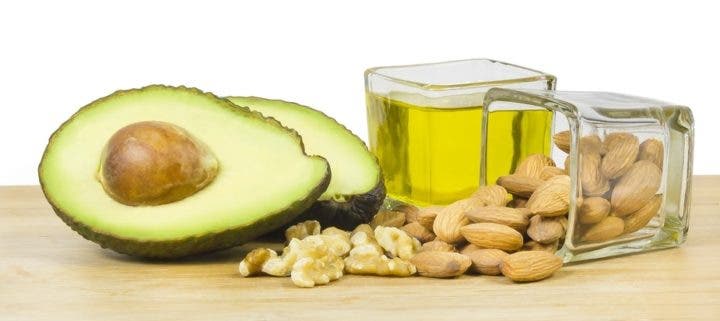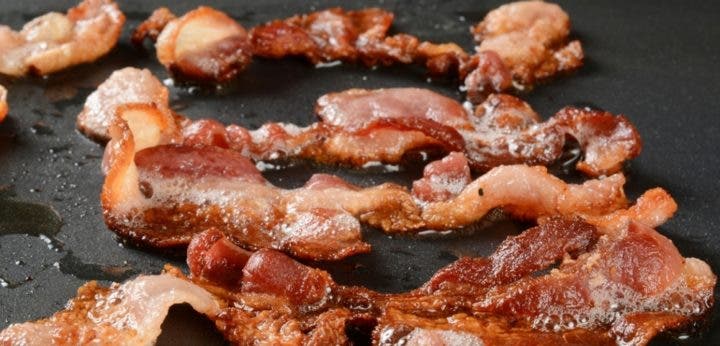When we talk about fats , it seems that all food related to this term does not have beneficial properties for our health. This happens because fats in the field of nutrition have been demonized for years, despite the fact that scientific research proves that they are not so bad, considering them an essential element for the proper functioning of the body.
These lipids not only make you feel full, but certain fats can reduce the risk of heart disease, improve blood vessel function and even help control blood sugar levels.
Find out what are the 4 most widespread ideas that people usually have about fats and why they turn out to be wrong.

4 myths about fats
1. Low-fat diets are healthier
Getting to the root of this myth is not too easy due to the widespread idea about consuming fat. As early as the 1940s, scientists knew there was a correlation between high-fat diets and cholesterol risk , so they began suggesting a low-fat diet to those with heart problems. The idea succeeded, and by 1960, the low-fat diet was the trend of the day.
A few years later, in the United States, Senator McGovern brought the topic of dietary guidelines to the audience. McGovern made some good points, criticizing the increase in soda intake, and criticizing the decrease in the consumption of vegetables and fruit. The senator recommended a carbohydrate intake between 55-65%, which led to a large amount of low-fat carbohydrates being consumed. The problem with this is that when people look for low-fat foods, they are not really healthy. They may think they are eating healthy, but in reality they are only eating refined sugar and carbohydrates.
Following in the process of discovering how low-fat diets influence our body, a study was published in 2006. This study examined almost 50,000 postmenopausal women with the objective of knowing the incidence of coronary heart disease, stroke, and cardiovascular disease. The results were clear: low-fat diets had no significant effects.
To this day, the stigma of the low-fat diet is wearing off in place of highly processed foods. The trend continues to change and we will not know what the future will hold, what is already known is that low-fat diets do not have important effects on the body.

2. All fats are the same
Although all fats provide 9 calories per gram , they are not all equal. Here’s a breakdown of the most common ones.
2.1. Healthy fats
2.1.1. Monounsaturated fats
These fats can reduce the risk of heart disease. One of the studies backing up this claim found that people living in Greece did not die of heart disease despite their high-fat diets. The researchers concluded that this was the case because they were eating monounsaturated fats, at which point they began to bet on the Mediterranean diet.
These types of fats can be found in foods such as nuts, avocados or peanut butter.

2.1.2. Polyunsaturated fats
These have many benefits similar to those of their companions. They can help improve cholesterol levels and lower your risk of heart disease. The types that you will have heard the most are Omega-6 and Omega-3, which help in the vital functions of the body.
You can find them in foods like salmon, trout, and soybeans.
2.2. Unhealthy fats
2.2.1. Saturated fats
Science can’t quite agree when it comes to fats. However, if there is agreement on the subject of saturated fats and that, if you limit the amount of these in your diet, the better, since they are associated with an increase in suffering from coronary heart disease.
These types of fats can be found in foods such as whole dairy products, red meat, and coconut oil.

2.2.2. Trans fat
These types of fats are related to heart problems and high cholesterol, and they have not yet been shown to provide any beneficial effect on our health. In addition, the FDA, (Food and Drug Administration), has banned from 2018 artificial trans fats, which are normally found in partially hydrogenated oils used in processed foods.
This certainly turns out to be good news. However, not all trans fats will go away. These also occur naturally in foods such as some meat and dairy products. However, these are not harmful enough for our body.
Therefore, to avoid this type of fat, it would be advisable to remove foods such as cookies, cakes and, ultimately, all industrial pastries from your diet.

3. All high-fat foods raise cholesterol
Cholesterol is a waxy substance found in the blood that your body needs to perform some cellular functions. High cholesterol has been associated with health problems for decades. This caused at the time a great fear of foods high in cholesterol , such as eggs.
However, one good thing about the years is that we are evolving and discovering new things regarding certain thoughts. In this case, today we understand that this does not work exactly like that, and it is that the problems associated with cholesterol have a lot to do with the fats and hydrates that are consumed, as well as genetics.
Returning to what was said in the previous myth, bad cholesterol is associated with saturated and trans fats , so you should limit the daily calorie intake of the former to a maximum of 10%, and completely eliminate the latter.
Unsaturated fats, on the other hand, can help lower your blood cholesterol levels . High-fat foods that contain monounsaturated fats can be part of a healthy diet, even for someone watching their cholesterol. For example, a handful of walnuts a day can help keep blood vessels healthy and reduce the risk of heart disease.

4. Eating foods high in fat makes you fat.
Fat helps you feel full, so there is a good chance that if you eat a meal rich in healthy fats, you will feel full faster and not overeat. But of course, this does not mean that you can give free rein to your consumption, but that you have to limit yourself to eating the recommended daily amount of fat , which is around 20% to 35% of the daily calorie intake, depending on your needs. .
That said, it is clear that fats, especially the monounsaturated and polyunsaturated types, should be part of a healthy diet and that they will not make you fat if you consume them in moderation.
Reference
- Amy Eisinger. 4 Myths About Fat You Need To Stop Believing. For Greatist [Revised August 2016]